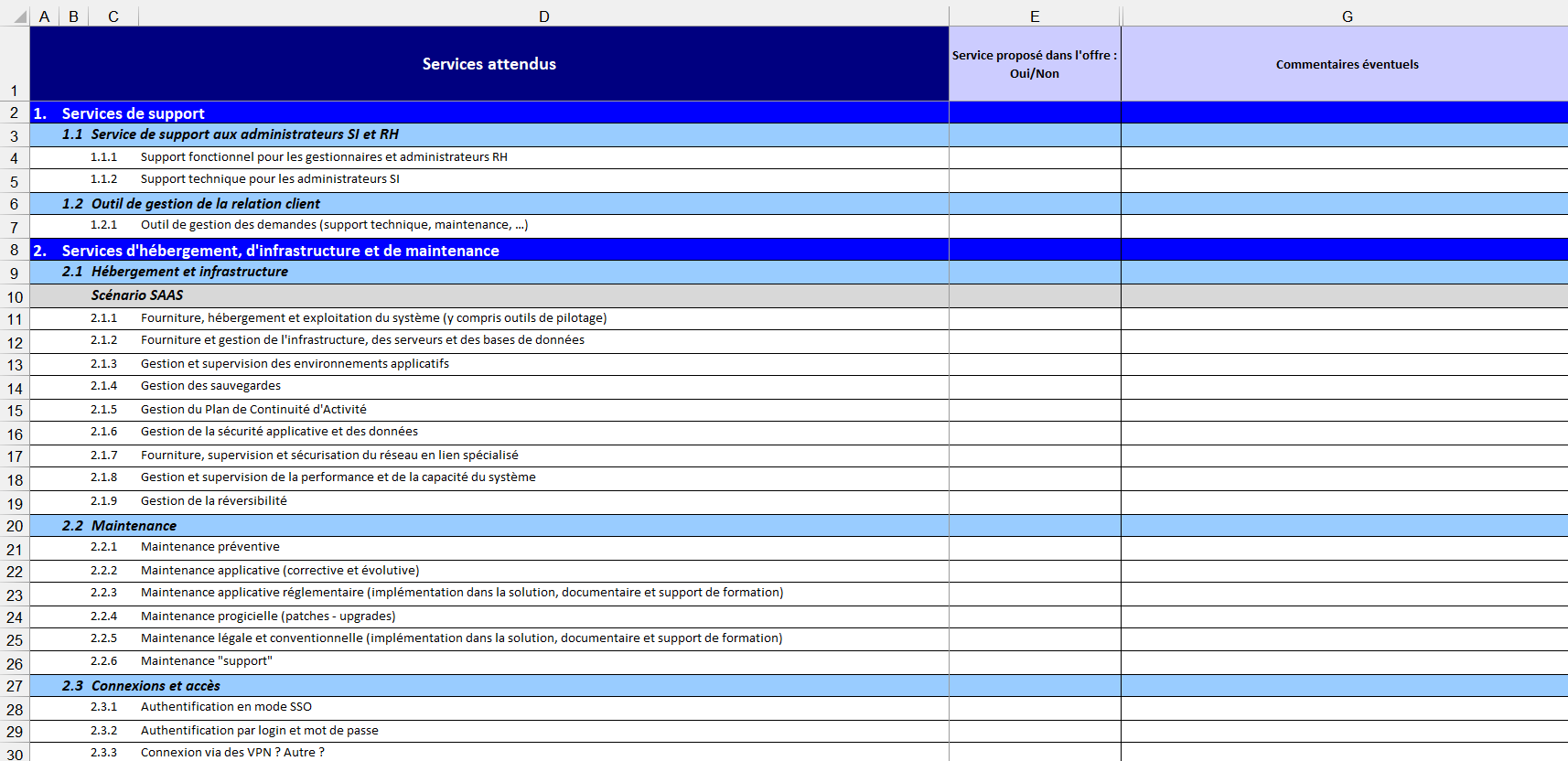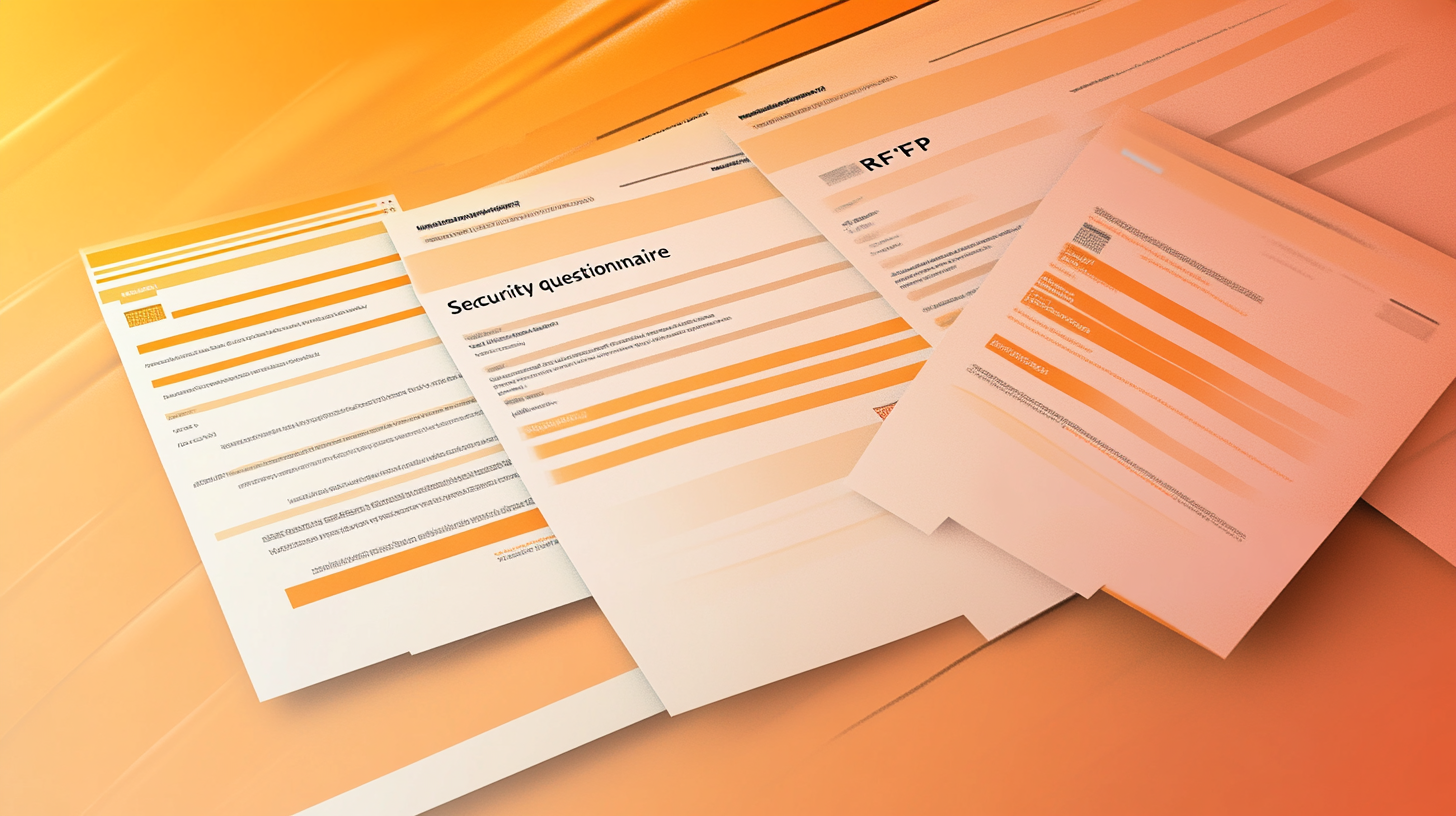How to optimize responses to security questionnaires during tenders?
The different categories of questions
Compliance questionnaires for tenders vary according to the sector of activity, project requirements and regulatory standards.
Here is an overview of the different types of questions you may face, classified according to their theme:
Computer security:
Verify the robustness of computer systems and data.
- Do you use firewalls and antivirus?
- Do you comply with ISO 27001 or RGPD standards (data protection...)?
Physical security:
To assess the safety of facilities and personnel.
- What are the access control devices?
- Do the installations comply with fire regulations?
Legal and regulatory compliance:
Ensure that the company complies with applicable laws and regulations.
- Has your business been audited recently?
- Do you have insurance for security incidents?
Answering a security questionnaire correctly will allow you to:
- Ensuring compliance to standards and regulations.
- Building trust of the customer by demonstrating risk control.
- Meet the requirements of the call for tenders to be eligible.
- Identify and reduce risks by evaluating and improving its practices.

How can you optimize your response to a security questionnaire?
Responding to a security questionnaire as part of a call for tenders requires rigor and a structured strategy. What are the best practices to adopt in order to succeed?
The essentials of answering a security questionnaire
Your future (we hope) customer will have many expectations, which must be met in an optimal way in order to guarantee your chances of success. To do this, in order to constitute a qualitative response file, it will be necessary to:
1. Understanding expectations
- Analyze the questions : Identify the specific requirements of the customer, whether or not they are explicit in the specifications (standards, certifications, procedures).
- Identify the critical points of the consultation : Note the areas where solid evidence or guarantees are expected.
2. Preparing the necessary documents
- Certifications and audits : Provide copies of the documents to be provided on the standards respected (ISO, RGPD, etc.).
- Internal policies : Gather written procedures for computer security, physical security, etc.
- Recent reports : Integrate audits, risk assessments, or management plans.
3. Be clear and to the point
- Adapted answers : Give only relevant information, without overloading.
- Use examples : Mention concrete cases or similar projects to illustrate your expertise.
- Avoid jargon : Make sure your answers are understandable for non-experts.
4. Highlight your assets
- Exceed expectations : If possible, offer additional guarantees (e.g. reduced response time in the event of an incident).
- Value your added value : Explain how your measurements exceed industry standards.
5. Verify and validate answers
- Reread carefully : Eliminate errors or inconsistencies.
- Have it validated by an expert securely or a legal manager to ensure accuracy.
6. Suggest follow-up
- Stay available : Clarify that you can provide additional information if required.
- Offer audits or meetings to strengthen collaboration.
Rigorous preparation and a structured approach will maximize your chances of convincing the customer.
The challenges associated with the production of a quality response
As you will have understood, given the challenges and the requirements in terms of tenders, answering a security questionnaire will be anything but obvious.
As a candidate company, it will also be necessary to take into account several constraints related to the specificity of tenders, in particular:
Organizational challenges
- Information collection : Gathering the necessary documents and data can be time-consuming, especially if the company does not have a centralized process.
- Internal coordination : Often involves multiple departments (IT, legal, HR, physical security), which can complicate the process.
- Fast adaptation : Sometimes you need to react quickly to unexpected requirements or last-minute clarifications.
Technical difficulties
- Specific requirements : The standards requested (ISO 27001, RGPD, etc.) may require adjustments or updates in your systems or procedures.
- Lack of documentation : If certain policies or formal proofs (audits, security plans) are not available, they must be created or obtained quickly.
- Tight deadlines : Tenders often have strict deadlines with a deadline, leaving little time to respond effectively.
Financial constraints
- Cost of compliance : Obtaining certifications or implementing technical solutions can be a significant investment.
- Mobilizing resources : The time and effort of the teams mobilized to answer the questionnaire have an indirect cost.
Legal and liability constraints
- Accuracy of answers : Any erroneous or incomplete information may result in the legal liability of the company.
- Risks of non-compliance : If you do not meet the requirements perfectly, it can disqualify you or weaken the customer relationship.
- Sharing sensitive information : Some answers may expose details about your systems or procedures, creating risks of information being leaked or abused.
In conclusion, to manage these constraints, make sure to:
- Anticipate : Prepare Upstream the necessary policies, certifications and processes.
- Centralize data : Maintain an accessible repository of security documents.
- Collaborate effectively : Appoint a manager to coordinate the contributions of the various teams.
- Manage privacy : Verify that the shared data is secure and compliant with non-disclosure clauses (NDA).
How can AI help you answer security quizzes?
Artificial intelligence (AI) can be a valuable asset in responding effectively to a security questionnaire as part of a tender. By integrating AI into your process, you improve the efficiency, accuracy, and quality of responses while reducing the workload of your teams.
Here are the main benefits of artificial intelligence:
Analysis and understanding of questionnaire questions
- Natural Language Processing (NLP) : Allows AI to understand the precise meaning of questions, even complex ones, to provide relevant answers.
- Summary of expectations : AI identifies questions, expectations and provides a clear and comprehensive summary
Documentary research and centralization
- Indexing documents : AI can quickly find and extract required information from internal databases (e.g. audits, certifications, reports).
- Management of references : It locates and structures the necessary evidence (e.g.: ISO certificates, security procedures).
- Increased collaboration : An AI centralizing the response steps allows a better visualization of progress for the project manager and a effective collaboration between all stakeholders.
Automating and securing responses
- Using predefined response templates : AI can analyze frequently asked questions and provide tailor-made answers based on your previous tenders.
- Fast content generation : By exploiting a database of existing responses, it proposes adapted formulations.
- Detecting inconsistencies : The AI checks that the answers do not contain errors or contradictions with your internal policies. Your experts will be able to complete the elements at any time before transmission.
- Regulatory compliance : It ensures that the answers comply with specific standards (e.g.: RGPD, ISO 27001), but also with the dematerialized formats of the documents requested by the platforms.
Personalization and improvement of responses
- Customizing responses : AI adapts content according to the specificities of the customer or the requirements of the sector. It allows you to make improvements to your answers to maximize their impact.
- Comparison with other projects : It identifies similar responses used in comparable contexts to refine your proposals.
Management of deadline constraints
- Productivity gains : AI speeds up the process considerably, making it possible to meet tight deadlines.
- Process monitoring : With an integrated workflow and a schedule for monitoring deadlines, AI allows you to ensure that the response process is running smoothly in real time.
Responding effectively to a security questionnaire as part of a call for tenders requires careful preparation, rigorous management of constraints and a structured approach.
A relevant tool, such as artificial intelligence can greatly facilitate this processs by automating certain tasks, improving the accuracy of responses, and speeding up the collection of information. This help not only streamlines the process, but also makes it easier to respond to a call for tenders.
By optimizing these steps, you increase your chances of success while ensuring compliance, security and the quality of the answers provided.
